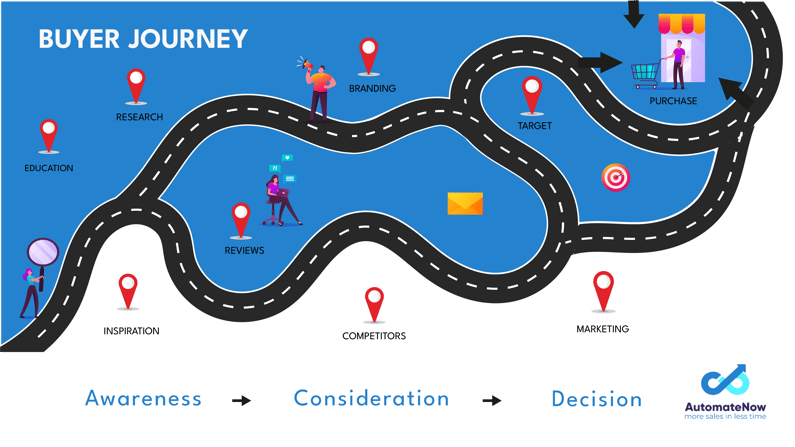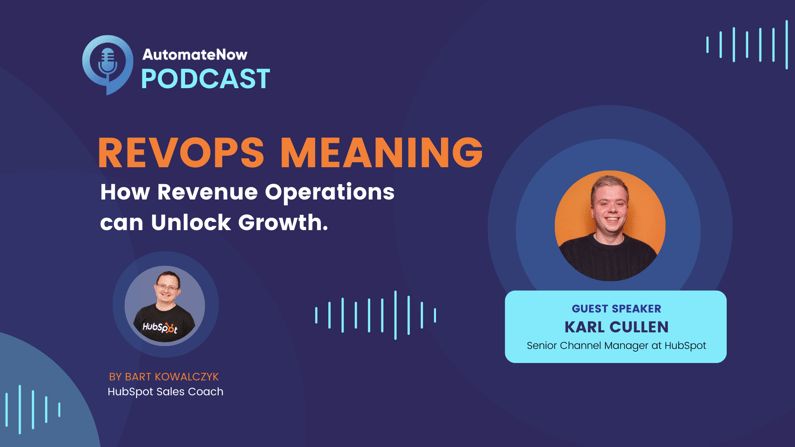
Start Your RevOps Journey in HubSpot: A Step-by-Step Guide
Unlocking the Power of Revenue Operations (RevOps) for Business Growth: A Conversation Between Bart and Karl.
Welcome to episode seven of the H2H Sales Automation Podcast, where we explore the world of revenue operations (RevOps) and its role in improving sales and marketing. In this episode, Bart invites Karl Cullen, Senior Channel Manager at HubSpot, to discuss the fundamentals of RevOps and how businesses can get started with this strategic integration of sales, marketing, and service departments.
Karl shares insights and practical advice on understanding RevOps, implementing processes, selecting the right platforms, defining metrics, and making sales and marketing more human-centric.
RevOps Meaning
RevOps, short for revenue operations, has gained popularity in recent years as companies focus on digital transformation and streamlining their operations. According to Karl, RevOps involves bringing together the customer-facing units of a business into one place. It aims to streamline processes, increase revenue, and enhance the customer experience by integrating sales, marketing, and service departments.
Understanding the RevOps Journey
Getting started with RevOps requires careful consideration and planning. Karl emphasizes the importance of being ready to invest in business growth rather than just maintaining the status quo. He highlights the three key elements of a RevOps strategy: platform, process, and people.
Platform: Selecting a comprehensive CRM platform that serves as a central source of truth for all customer-related data is crucial. This platform can be a single system or a combination of tools, depending on the business's needs and industry.
Process: Understanding and mapping out the existing business processes is the next step. This includes analyzing marketing strategies, sales processes, and customer service interactions. By identifying buyer personas, buyer journeys, and defined deal stages, businesses gain clarity on how these processes work and can be improved.

Example of buyer journey touchpoints
People: The success of RevOps implementation relies heavily on people. Change management becomes essential, as employees need to adapt to new ways of working. Appointing champions within each department can help drive adoption and support training efforts.
How to track RevOps Success: Metrics and Measurement
RevOps revolves around data-driven decision-making. While revenue is the primary metric for assessing growth, Karl suggests considering additional metrics specific to each department. For marketing, measuring website traffic, conversion rates, and lead generation are essential. Sales metrics may include opportunities created, lost, and closed, while customer service metrics might focus on churn rates and retention.
The Importance of Adaptation and Calibration
RevOps is not a one-time strategy but an ongoing process. Bart emphasizes the need for calibration and adaptation as businesses evolve. It's crucial to regularly review and update processes based on changes in offerings, customer preferences, or market dynamics. By closely monitoring and analyzing data, businesses can make informed decisions and optimize their operations continually.
RevOps in Action
While the implementation path varies depending on the business size and complexity, success stories are abundant. Smaller businesses may start with a phased approach, gradually incorporating tools and focusing on a few key metrics. Larger organizations may undertake a comprehensive RevOps strategy involving multiple platforms and departments. Regardless of the approach, businesses that embrace RevOps can improve personalization, enhance customer experiences, and drive growth.
What Revops System to consider?
Implementing RevOps can be a transformative journey for businesses looking to align sales, marketing, and service departments. By integrating processes, selecting the right platforms, and prioritizing people and change management, businesses can enhance revenue, improve customer experiences, and make their sales and marketing efforts more human-centric. Regular calibration, data analysis, and adaptation are crucial for sustained success in the ever-evolving business landscape. Embracing RevOps empowers businesses to stay relevant, make informed decisions, and create meaningful connections with their customers.
Worth to know about RevOps:
Q: What is Revenue Operations?
A: Revenue Operations, also known as RevOps, is a strategic approach that aligns sales, marketing, and customer success teams to drive revenue growth for a business. It involves breaking down departmental silos and creating a unified revenue team with shared goals and metrics.
Q: Why is Revenue Operations important?
A: Revenue Operations is important because it helps businesses align their sales, marketing, and customer success functions, resulting in improved efficiency, productivity, and revenue growth. It eliminates the silo mentality and creates a single source of truth for all revenue-related activities.
Q: How can Revenue Operations drive revenue growth?
A: Revenue Operations can drive revenue growth by optimizing the entire customer journey, from lead generation to customer retention. By aligning sales, marketing, and customer success, businesses can streamline their revenue process, identify bottlenecks, and make data-driven decisions to improve customer acquisition, retention, and upsells.
Q: What is the role of a RevOps team?
A: A RevOps team is responsible for overseeing and executing revenue operations strategies. They play a crucial role in aligning sales, marketing, and customer success teams, implementing and managing revenue operations tools, and analyzing revenue operations metrics to identify areas of improvement.
Q: How does Revenue Operations help with customer success?
A: Revenue Operations helps with customer success by providing a holistic view of the customer journey. By aligning sales, marketing, and customer success teams, businesses can ensure a seamless transition from prospect to customer and focus on delivering consistent, personalized experiences throughout the customer lifecycle.
Q: What are the benefits of implementing Revenue Operations?
A: Implementing Revenue Operations has several benefits, including improved revenue growth, enhanced customer experience, increased efficiency and productivity, better data visibility and analytics, optimized sales processes, and improved collaboration and alignment between sales, marketing, and customer success teams.
Q: What are some key Revenue Operations metrics?
A: Some key Revenue Operations metrics include revenue growth rate, customer churn rate, customer lifetime value, conversion rates at different stages of the sales funnel, pipeline velocity, deal size, and revenue attribution to marketing and sales activities.
Q: Who should be involved in Revenue Operations?
A: Revenue Operations involves multiple departments, including sales, marketing, and customer success. Additionally, key stakeholders such as the Chief Revenue Officer (CRO) and executives from these departments should be involved in the strategic planning and implementation of Revenue Operations.
Q: How can Revenue Operations help with organizational alignment?
A: Revenue Operations helps with organizational alignment by breaking down departmental silos and creating a unified revenue team. It establishes shared goals, metrics, and processes, ensuring that all departments are working towards the common objective of revenue growth.
Q: How can a business implement Revenue Operations successfully?
A: To successfully implement Revenue Operations, a business needs to have clear communication and collaboration channels between sales, marketing, and customer success teams. It also requires investment in the right tools, defining and aligning on key metrics, and strong leadership support to drive the necessary cultural and process changes.
Listen Full Episode here







